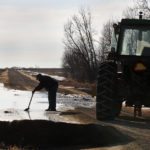There are many factors that can affect how quickly harvested grain moves from a remote farm location in Western Canada to an outbound ocean vessel on Canada’s West Coast. According to sources in the grain industry, the main factors behind this year’s shipment delays aren’t much different than usual — bad weather and bad industry […] Read more
Barley

Barley may thrive under climate change
Climate change could result in warmer and wetter conditions in northern Alberta and warmer and drier in the south
A warming climate could be good news for Alberta’s barley industry. University of Alberta researchers have embarked on a ongoing project to study adaptive measures and opportunities for water use for agriculture, petroleum and other sectors in the province. Watershed scientist Monireh Faramarzi and others have combined hydrology and climate models to assess water supplies […] Read more
Herbicides: Carrying on during and after a drought
Herbicide carryover should always be a concern following a dry year. Throughout my career, I have seen this issue reoccur after every drought. This makes me think that 2018 could see herbicide carryover issues raise their ugly heads again. In this column I will discuss why this issue is likely to show up and explain […] Read more
More fertilizer price info would be welcome
According to the farm input price survey published monthly by Alberta Agriculture, the average price of full service anhydrous fertilizer (82-0-0) increased from roughly $782 a tonne in January to $818 in February. Phosphate prices (11-51-0) also increased, going from about $701 to $725 per tonne. Somewhat surprisingly, urea prices (46-0-0) continued their three month […] Read more
Canadian feeders imports more dried distillers grain from U.S.
WINNIPEG (CNS Canada) — A better quality Canadian grain crop in 2017 has opened the door to increased imports of distillers dried grains with solubles from the United States as Canadian livestock feeders look for other options. Canada imported about 700,000 tonnes of the ethanol byproduct from the U.S. in 2017, the largest imports since […] Read more
Fusarium still minor problem in Alberta
Alberta’s fusarium graminearum levels are much lower compared to Manitoba and Saskatchewan, but the disease is starting to spread throughout the province. It was not an issue in 2007 for Alberta, but since then it has increased and the heavy moisture conditions of 2016 resulted in the worst year ever for disease. About 20 percent […] Read more

CP says grain movement is turning around
Canadian Pacific Railway’s letter to federal ministers says it is re-setting its network as it rebounds from February weather challenges. Train speed and overall throughput are both increasing, which is good for grain transport and other commodities, said the letter from CEO Keith Creel. The company has hauled more grain this crop year even with […] Read more

CN responds to gov’t with grain movement plan
Canadian National Railway has released its grain transportation response to federal Transport Minister Marc Garneau and Agriculture Minister Lawrence MacAulay. The ministers had asked the two major railways to submit their plans to get grain moving by March 15. According to a March 14 update posted on CN’s website, as per the ministers’ request, the […] Read more

Runoff risk rises in Sask. after recent snowfalls
Last week’s snowfall has raised the prospects for near normal runoff in parts of Saskatchewan The Water Security Agency in its updated spring runoff outlook March 13 said between 20 and 45 centimetres of snow March 3-5 changed initial projections for a below normal runoff. “Assuming near normal conditions going forward to the melt, a […] Read more

‘Shipping season has been a disaster’
OTTAWA — The House of Commons agriculture committee was scheduled to hold an emergency meeting March 7 to discuss the grain transportation backlog, even though Parliament is not sitting this week. Four committee members representing both the Conservative and NDP opposition forced the meeting after delivering a request to the committee clerk March 1. That […] Read more




